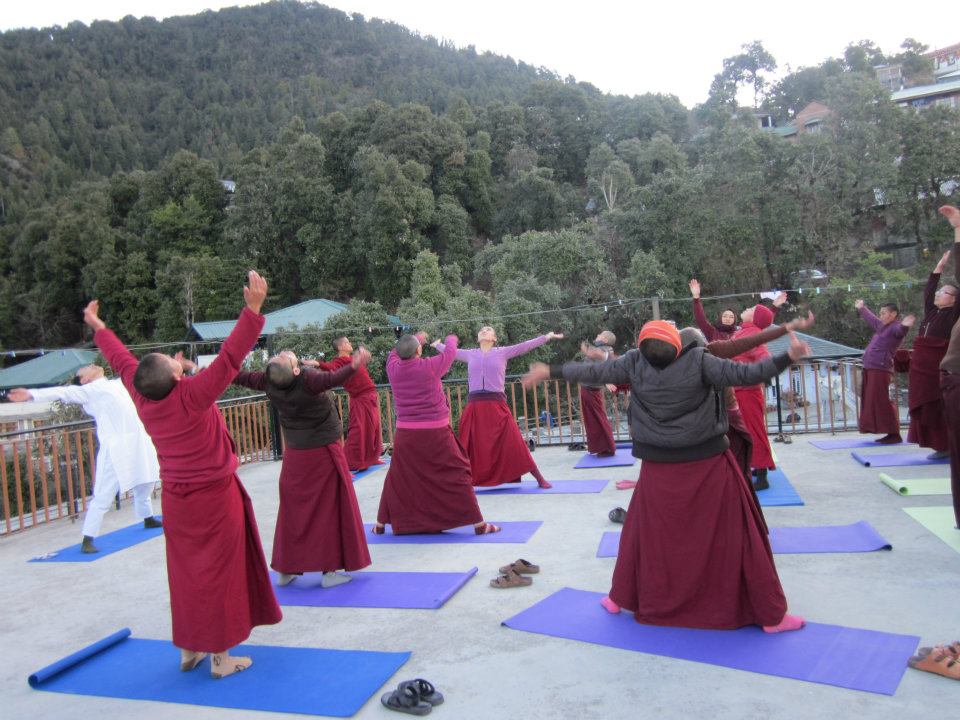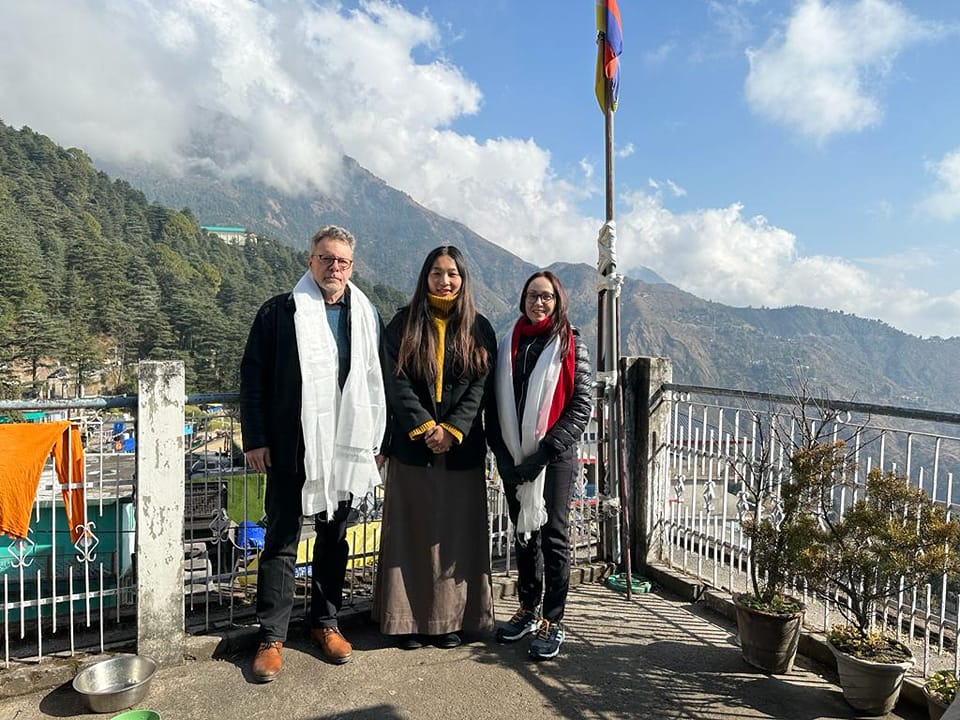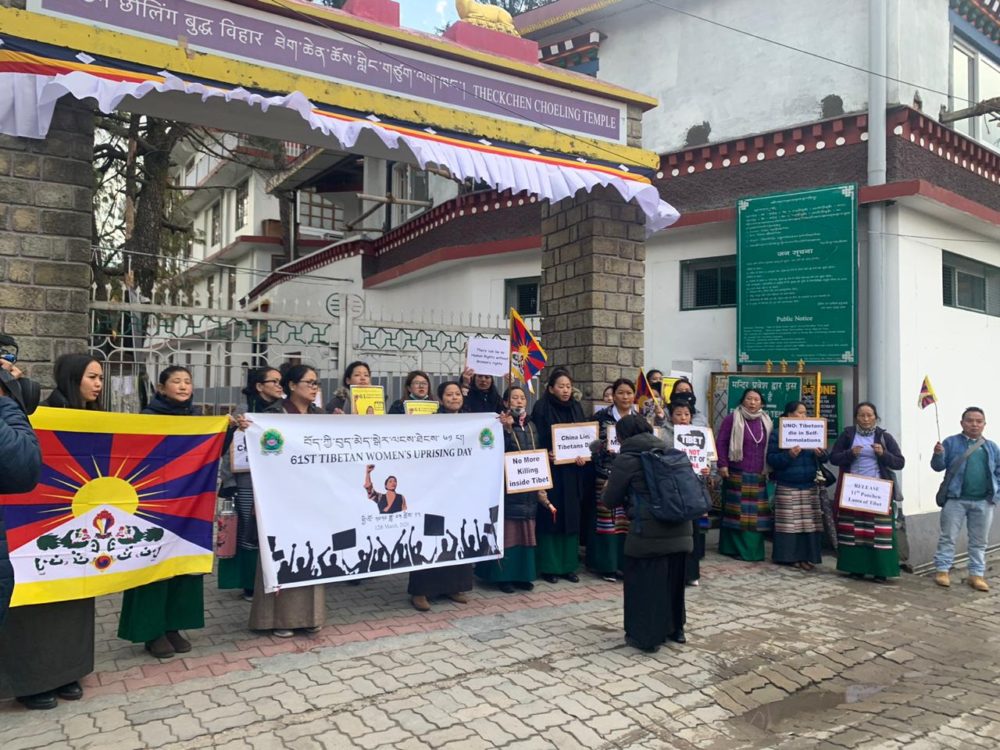Report: 4th Annual Buddhist Nun’s Leadership Training 7th – 13th March 2012
Report from TWA Empowerment through Action Desk
4th Annual Buddhist Nun’s Leadership Training
7th – 13th March 2012
House of Peace and Dialogue, Upper TCV School, Dharamsala
 The week-long ‘4th Annual Nun’s Leadership Training,’ held from March 7th – 13th,2012, was attended by 17 nuns from 8 nunneries based in Nepal (Khachoe Ghakyil Ling Nunnery), Ladakh (Gephel Shadrupling), Tashi Jong (Dongyu Gatseling), Drikung Samtenling (Dehra Dun), Garoh (Jamyang Choeling and Shugseb Ugen Dzong), Solan (Redna Menriling), and Gaden Choeling in Dharamsala. The training highlighted basic leadership topics including communication skills, team building and management, goal setting, gender sensitization, and project proposal writing. The participants were also given an opportunity to observe and participate in a rare panel discussion.
The week-long ‘4th Annual Nun’s Leadership Training,’ held from March 7th – 13th,2012, was attended by 17 nuns from 8 nunneries based in Nepal (Khachoe Ghakyil Ling Nunnery), Ladakh (Gephel Shadrupling), Tashi Jong (Dongyu Gatseling), Drikung Samtenling (Dehra Dun), Garoh (Jamyang Choeling and Shugseb Ugen Dzong), Solan (Redna Menriling), and Gaden Choeling in Dharamsala. The training highlighted basic leadership topics including communication skills, team building and management, goal setting, gender sensitization, and project proposal writing. The participants were also given an opportunity to observe and participate in a rare panel discussion.
Day One
The morning yoga session was an anticipated activity, as it was the first time many of the nuns had ever experienced yoga. Afterward, TWA’s General Secretary, Tsering Yangzom, welcomed the participants and shared with them the objectives and account of this training, which has gradually expanded since inception in January 2009. The ice breaking session challenged the nuns with fun puzzles and mind exercises; the goal of the mind games was to assess one’s self-confidence and ability to think creatively. As much as the participants enjoyed the mind games, they also benefitted from a reflection on life skills. The puzzles required them to think unconventionally, leading them to new perspectives that can extend to obstacles beyond those provided at the workshop.
Later, the participants discussed ground rules they preferred to apply for the duration of the workshop. The nuns also picked a ‘secret friend’ that they would present a gift to at the end of the week, a practice that incorporated the importance of secrecy into the program.
After lunch, TWA began a formal introduction session and screened a few short videos highlighting TWA involvement in the Tibetan community before the orientation round. The evening session was led by the TWA Grants manager, Tsering Wangmo, who gave a presentation on ‘Tips for Proposal Writing’ to assist the nuns in composing their eventual group project proposal. Before they concluded the evening, the nuns gathered for their group strategy meetings.
Day Two
Dhardon Sharling, TWA Research and Media officer, began the morning with a session on Communication skills. The nuns played the game ‘Finding the Animal Partner,’ which underlined lessons about communication and the significant difference between animals and human beings: our enhanced ability to communicate. The nuns were introduced to concepts of communication through exercises, demonstrations, and group role-plays. One of the nuns mentioned that she had never considered these concepts to be as important as discussed and said she will keep in mind the skills she was introduced to.
Tenzin Tseyang, Coordinator for the Women’s Empowerment Desk, CTA, conducted the afternoon session on ‘Women’s Empowerment and Gender Sensitization’. Her session included group discussions and presentations that highlighted many ideas and stereotypes present in our society. The participants were amazed at how their own notions and ideas had societal influence, and the term “gender” gained an enhanced meaning for them. The participants often shared their thoughts with Tseyang la through questions, though Tseyang la encouraged them to discover the answers for themselves as a way to develop personal views on the subject. A group picture of the participants with the Tenzin Tseyang concluded the afternoon session.
Day Three
The first exercise of the day encouraged the participants to visualize their future ten years from now and present what they saw in as accurate a drawing as possible. The participants shared their dreams and goals to the larger group, and the trainers discussed with the nuns how setting goals is important. The group spent hours contemplating their present and future lives and ways that they could improve their predicaments through setting goals. The first and most crucial step of creating change is to set smart goals that provide a clear direction and focus. Having an objective in mind guides one’s decisions, lends purpose and efficiency to work, and builds one’s self-confidence as they climb closer to reaching their aim.
The participants shared many laughs during the exercise ‘making the perfect square,’ which required them to tie their eyes without verbal communication. It was a delight to watch them perform the task with creativity and a sense of humor. These exercises tested the group’s team effectiveness and management. We reviewed the importance of teamwork and team effectiveness before the group joined together for another exercise. Using team work, the nuns competed to ‘create the biggest structure’ within the time allotted. As was discussed, we saw the teams utilize their teamwork skills to perform the task.
The afternoon session reviewed a few important concepts such as leadership challenges, characteristics of a good leader, values cherished in life, and the importance of feedbacks and feed forwards. The exercise that concluded the afternoon’s session was titled, ‘The Changes I Need to Make.’ The participants were instructed to write down one habit or hobby that they would like to stop doing, continue doing, and start doing from that moment forward.
TWA Women, Environment and Development Desk officer, Tenzin Woebum, conducted a session on how her desk was created at TWA, WEDD objectives, and WEDD accomplishments. Afterwards, Woebum la gave a presentation on Tibet’s environment, which brought back childhood memories in Tibet and stirred the emotions of many nuns.
Day Four
As March 10th marked the 53rd Tibetan National Uprising Day of the Tibetan struggle, the participants attended the official function graced by His Holiness the Dalai Lama, the Kalon Tripa, and the Speaker, held at the main temple. The participants also joined the peaceful protest march led by 5 major NGOs, including TWA, after the event.
Later in the evening, a debate was organized among the 3 groups of nuns, moderated by TWA General Secretary. The topic was ‘A Nun Abode in your Nunnery’. The debate was filmed and later screened to provide an opportunity for the nuns to view how they utilized their communication skills, with particular attention to their body language. The exercise proved effective for the nuns, who were able to see themselves in action and consider how they can improve their debate skills for the future. The nuns met for a group strategy meeting before they went to sleep.
Day Five
The auditorium was filed with curiosity and some reservations over group projects, as today was the day each group would present their proposal to TWA staff. The presentations would determine whether the nuns could implement their project as planned and proposed. Finally, the hours of project proposal group strategy meeting came to an end, with the teams ready to present their projects. The presentations were all exceptional and demonstrated ample creative talent, though the group Do-Phen Khangtsen took away the bonus prize.
Group Projects:
Shyway Detsen
The team’s project title was ‘Munsel Donmey,’ and they targeted children at Nyingtopling, a center for the handicapped. Shyway Detsen’s idea was to spend quality time with the children there and prove to them that they are never alone. The nuns wanted to help them bathe, cut their nails, and perform other necessary tasks that can sometimes prove difficult for the children.
The team took a number of drawing books, colors, sweets, hankies, and soaps with them to give to the children. The nuns came back with some exceptional drawings by the children, and the pictures demonstrated that the children had wonderful time playing around, talking to, and getting to know the nuns.
Ven. Thupten Kunzes said in her project report that “The smiles her group could bring to the children at Nyingtopling through this project were so rewarding. I am happy we could implement our project as planned and proposed.”
The Choe-dhe Khangtsen
This project’s theme was Environment, which the nuns deemed a great concern for humanity and a matter each of us has the responsibility to protect. Their title was ‘Ecological Balance,’ and the project served our Indian friends at Kotwali bazaar. The plan emphasized clean surroundings and how harmful pollution is for one’s health. The nuns also wanted to inform our local friends that the Tibetans care and worry about their health and environment. The team of 5 nuns travelled to Kotwali market and picked up as much garbage as they could. They spoke to many people as they cleaned, explaining why they were clearing the area and how important it was that the community keep it clean. The nuns also donated a large dust bin to the kitchen at Upper TCV School for everyday use.
One of the group members said in the project report, ”It was impossible for five of us to clean the heaps of garbage around Kotwali in just 5 hours, but we are content that we did our bit.”
Do-Phen Khangtsen
This group’s project was like a mini-training in itself. Do-Phen Khangtsen went to Jamyang Choeling Nunnery, Garoh and gathered 20 younger nuns into a hall. Each nun chose a topic and mind game similar to those practiced in the Nun’s Empowerment training to introduce to the younger nuns. Their idea was to create awareness about the trainings available in our community and demonstrate how fun and helpful they can be. They wanted to try to remove the fear and hesitation that surfaces in many minds when one hears the word “training” or “workshop”. In their project report, the nuns said that they had the best of times while implementing the project, laughing through incidents they endured before coming to this training.
Do-Phen Khangtsen also planted 17 eco-friendly plants around Jamyang Choeling nunnery. One of the group members is from this nunnery and procured a trustworthy friend to take good care of the plants in future. They also gifted a flower plant to the nunnery’s office desk as a token of appreciation for allowing the group to implement their project.
Ven. Migmar Choedon said, “It is great feeling having implemented the project; I was really worried if we could complete the project as proposed.”
The nuns had 5 hours to implement their project and report back to the training venue. All of the teams had well-drafted their project, very clearly distributed the work, and suited their project to the time allocated and the budget. It was difficult to choose the best out of bests.
At the end of the day, the nuns again sat in groups, prepared their project report, and the shared their feelings with the larger group.
An evening with Mrs. Namgyal Taklha
The nuns had a long day, but it did not end there. Mrs. Namgyal Lhamo Taklha arrived to address the participants for half an hour on being sincere to one self, to one’s religion and culture, the importance of maintaining codes of conduct, and most importantly, believing in oneself. Madam Taklha recounted facts from the past about the nuns, nunneries, and the amenities they received when she was younger- things are much better these days. Mrs. Taklha recounted some humorous stories with the participants, filling the auditorium with amusement and laughter. Mrs. Taklha reemphasized that the nuns must believe in themselves, complete their education, serve the community. She stressed to the nuns the importance of intensely analyzing the concepts they are introduced in life and incorporating the good ones into everyday interactions. Mrs. Taklha applauded the organizers for having thought of the nuns and requested to continue with such initiatives.
Day Six
The nuns commemorated the 53rd Anniversary of National Women’s Uprising Day and joined the function and peaceful protest march organized by Tibetan Women’s Association at the main temple. The nuns were given a “See and Believe” experience on event organizing. The participants were separated into their groups and given major tasks to prepare the 12th March function, guided by three TWA Executives. One group arranged the function arena by setting up the decorations, sound systems, and sitting arrangements, while the second group worked on the invitations to be sent to the guests, the former TWA Executives and contacting the media over phone. The final group was in charge of receiving the guests and media to the function, accompanying them to their seats. They also managed to make sure everyone marched in single line during the protest march. Though the tasks were simple, the nuns seemed to enjoy the event and their duties thoroughly and relished in an opportunity to contribute alongside other women in the community.
The screening of ‘Journey from Zanskar: A Monk’s Vow to Children’ touched everyone so deeply that I am sure everyone cried trying to relate their own stories with the children in the movie. Many nuns gave an account of their childhood and the struggles they endured in the hope of receiving a better education.
After the screening, the nuns were separated into their groups and given tasks to prepare for the next day’s Panel Discussion. Shyway Dhetsen was given the responsibility of welcoming and receiving the panelists and the special guests, taking them to the special tea room, inviting them to auditorium for the panel discussion, and thanking them and seeing them off after the networking lunch. Choe-dhe Khangtsen was to decorate and arrange the auditorium, while Do-phen Khangtsen had to arrange the networking lunch, set up and arrange the meals, and take care of the panelists and special guests.
Day Seven
The participants were very excited about the panel discussion and their roles in bringing the event together. All of them were eager to begin their duties early in the morning, even trying to help each other as teams. As the clock ticked, duties were completed and finally it was time to begin the panel discussion.
Three prominent and distinguished personalities participated: Geshe Monlam Tharchin, Member of the Tibetan Parliament in Exile, Rev. Lobsang Dechen, the Executive Director of the Tibetan Nun’s Project, and Mr. Ngawang Choedak, Secretary of the Department of Religion. Each panellist offered powerful insight and constructive suggestions pertaining to ‘Political Participation by Tibetan Nuns in the Exile Diaspora’ and presented additional feedback in a question and answer session.
The two-hour panel discussion was moderated by Kirti Dolker Lhamo, a member of the Tibetan Parliament in Exile and President of TWA.
Speaker Geshe Monlam Tharchin, while applauding TWA for organizing the training, remarked, “I do not see any literary contributions from the nuns, and it would be wonderful to see them contributing literally. I also do not limit my definition of a nun’s political participation to attending protest marches and vigils. As an individual, it is important to work and act according to the need of the hour. Thus, keeping the present situation inside Tibet in mind, the first thing I do in the morning is log onto the internet and read what’s happening inside Tibet.” Geshe Monlam Tharchin also mentioned that education is a key tool for creating change and nuns must study hard.
Speaker Rev. Lobsang Dechen reminded the group about the divisions in Tibetan society among lay people, monks, and nuns, stating that ‘in the past years Tibetan nuns have lacked educational and political participation opportunities’. However, she pointed out that ‘support and guidance from His Holiness the Dalai Lama and the Tibetan community are diminishing these obstacles, declaring that nunneries are improving their facilities and offering a stronger role for nuns in Tibetan society’. Dechen referred to His Holiness’s recent speech on 8th March 2012 and asserted that ‘Tibetans must seize every opportunity to work together and better the entire community’. She recalled the ‘political achievements of Ven. Thinley Chodon and Ven. Pachen Dolma as exceptional examples in Tibetan history’.
Rev. Dechen also discussed the topic of Geshemas, emphasizing the need for a permanent Geshema program. “It will not be enough if we produce two or three Geshemas, we must think about continuity and permanence,” she said. Dechen insisted that ‘there is nothing to fear of discussions about Gelongma and that a debate about the importance of such opportunities in the nun community is necessary’.
Rev. Lobsang Dechen also emphasized the ‘need for nuns with certain qualifications and degrees who will eventually be able to administer their own nunneries and contribute back to their community’. She referred to a few graduate nuns from Dolmaling, now teaching Buddhism at schools in Bylakuppe and north-eastern parts of India, who ‘demonstrate the valuable potential of nuns with a complete education’.
“It’s time we stop thinking ‘we cannot do this’; believe in yourself and build up confidence with ample supports like this program. If you work hard, then it is possible that someday you can become a Chithue or a Kalon” concluded Dechen.
Mr. Ngawang Choedak, Secretary of the Department of Religion, CTA, offered some reflections on creative ways that nuns can serve the Tibetan community. He proposed that ‘nuns could work with Tibetan parents to assist in the moral upbringing of their children, or organize programs in conjunction with non-Tibetan NGOs to introduce Tibetan religion and culture to other interested communities’. Mr. Ngawang stated that ‘we all have unexplored capacities that can be developed, and events like the Nun’s Empowerment Program provide opportunities for nuns that should not be overlooked’.
Ngawang Choedak said also said, “It would be great if our nuns can form ‘Nun-Associations’ and build networks with the Christian nunneries or other international Women’s Associations.”
The panel discussion was followed by a networking cum farewell lunch for the nuns; we remain thankful to our panellists and special guests of Tibetan Children’s Village for kindly consenting to stay for the lunch and give the participants an opportunity to network. We remember how the participants reacted to the idea of a networking lunch when they were first told about it, but experiencing it was completely a new experience for the participants.
The nuns expressed that this program assisted them in realising their skills and reinforced their beliefs and self-confidence. TWA hopes to see the nuns pursue leadership roles in greater numbers and at higher levels. We look forward to another enriching and empowering program to be held in 2013.
TWA remains thankful to our sponsor Science Meets Dharma, based in Zurich, for supporting our annual project with much-needed financial support since its inception in 2009. We thank the participants without whom implementation of this project would never be possible. Finally, we would like to thank Tibetan Children’s Village for providing the space for this workshop to come to life.
Note: Pictures available on TWA’s Flickr account

Quotes from the participants:
“It has been a wonderful week; I enjoyed each day, which gave me a complete exposure and I thank you for inviting us. I would love to attend the next program to learn more.”
– Kunchok Lhamo, Drikung Samtenling, Dehra Dun.
“I enjoyed a lot throughout the program and I will do my best to lead a similar session at my nunnery for the younger nuns. I will continue with the yoga daily”
-Ven. Lobsang Dolma, Redna Menriling, Solan.
“This program has been very helpful and I would recommend it to my friends and other nuns”
-Ven. Tenzin Chokyi, Dongyu Gatseling, Tashi Jong.




